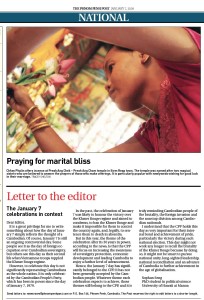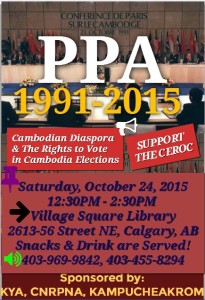The State and the CPP: Cambodia’s Social Contract
In Cambodia, Hun Sen’s CPP — not the government — has a monopoly on providing public goods.
By David Hutt
August 19, 2016
Op-Ed: The Diplomat

Half way through writing this piece, the perfect encapsulation of the points I was intending to make was provided when Cambodia’s Prime Minister Hun Sen spoke to a group of 18-year-old high-schoolers on Wednesday. At the Hun Sen Bun Rany High School, named after himself and his wife, he asked: “You have been learning under the schools of samdech; how come you don’t vote for samdech?” (referring to his royally bestowed title that translates roughly as “lord”). He added: “How can you vote for the others when they have never built schools for you? Please help to tell your parents, too.”
Where to begin with such a remark? First, Hun Sen was breaking his own government’s law banning political propaganda at academic institutions. This isn’t the first time, though; in June, students in Pursat province were handed t-shirts bearing the words: “I love the Cambodian People’s Party.” Second, after breaking his own rules, which were reinforced by Minister of Education Hang Chuon Naron only a month earlier, the CPP’s spokesman Sok Eysan justified his actions by saying that Hun Sen is above Hang Chuon Naron, the insinuation being that all decisions certainly do lie with the boss. Third, and by far the most significant, his comments reveal the synonymous nature of the Cambodian State and the CPP.
Not unlike the reign of Norodom Sihanouk, or the Angkorean “god-kings” of earlier centuries, the current Cambodian system operates on the basis of noblesse oblige. The vision of society is one where education, health, roads, and other basic services are not provided by the State (as they are, or, arguably, should be, in most modern democratic countries) but by the CPP. Since 2003, there have been more than 4,000 schools built across Cambodia using private funds, and named after the prime minister or his wife. These are the so-called “Hun Sen schools.” The same goes for hospitals, roads, bridges, and other services and infrastructure. Many have been built from donations made by CPP-aligned oknhas. Traditionally the title given by the king to nobles, since a sub-decree in 1994 resurrected the honorific the number of oknhas has swelled, from 20 in 2004 to an estimated 700 in 2014. To become a member of this semantic club, one must donate $100,000 to the “greater good,” often basic infrastructure projects, and in return is granted material gratitude, and the turning of a few blind eyes. The Buddhist concept of merit no doubt has history here, though in the modern day it can be greatly exaggerated. Rather than karma, capital and power fuels the system.



